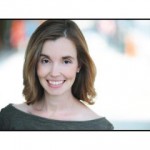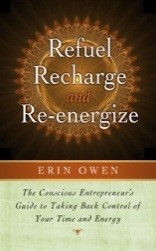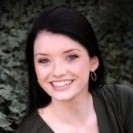Contributor: Liz Stiverson
Work and Life is a two-hour radio program hosted by Stew Friedman, director of the Wharton Work/Life Integration Project, on Sirius XM’s Channel 111, Business Radio Powered by Wharton. Every Tuesday from 7 pm to 9 pm EST, Stew speaks with everyday people and the world’s leading experts about creating harmony among work, home, community, and the private self (mind, body and spirit).
On January 14, the first episode of Work and Life on Sirius XM’s Business Radio Powered by The Wharton School, Stew Friedman continued the discussion he began with Brett Hurt, on the seemingly-paradoxical benefits of slowing down at work in order to get more done, in a conversation with Erin Owen. Erin Owen is a performance breakthrough coach, which she describes as “a combination of an Eastern guru, a business coach, a life coach, a health coach, and a time management master.” She helps professionals and entrepreneurs apply the wisdom of ancient Eastern philosophical and energetic practices to modern, Western ideas of performance.
Business Radio Powered by The Wharton School, Stew Friedman continued the discussion he began with Brett Hurt, on the seemingly-paradoxical benefits of slowing down at work in order to get more done, in a conversation with Erin Owen. Erin Owen is a performance breakthrough coach, which she describes as “a combination of an Eastern guru, a business coach, a life coach, a health coach, and a time management master.” She helps professionals and entrepreneurs apply the wisdom of ancient Eastern philosophical and energetic practices to modern, Western ideas of performance.
Following are edited excerpts of Owen’s conversation with Friedman.
Stew Friedman: How did you get into this? How did you discover the wisdom of the East?
Erin Owen: I was working for a large consulting firm, on a lot of complex international projects, on a crazy schedule, with 60+-hour weeks. It was high-intensity stress, but very intellectually stimulating, which is what drove my ego to keep working harder to get better results. But that reality drove my health into the ground at a very young age, in my late twenties. Even after working with specialists and taking medication, I started to have problems with my short-term memory. That was a really scary point, at which I said the way I’m living is not working – something has got to change.
I started a series of experiments and alternative practices, part of them from an Eastern point of view. At a very young age I was drawn to things Chinese; when we studied world history in high school, I thought, “Wow, these people really have something figured out – they’ve been inventing things for thousands of years, and it’s so much different than the European perspective.” So when it came time to choose a college I wanted to make sure I had an opportunity to study the Chinese language and really dig into the culture.
There are so many dimensions to Chinese philosophy. Yin and yang is the idea that there is and can be balance in the world. Contraction and expansion is a yin and yang comparison. Contractions, things that are very dense and hard, are yang. Things that are the opposite – expansion, open, flowing – are yin. I find that one of the qualities missing most in people who are out of balance is yin. If you can find a way to bring more openness, more flow, more subtlety, and more quiet into your life, you get a lot more out of it. Working harder is not the answer. By creating more time and space in my life, allowing myself to relax, to nourish my body, mind and spirit, I can show up more focused mentally, be more present and engaged in conversations, be more creative in my work and get better results. That’s counter to the culture we’re living in.
SF: Can you give an example?
EO: An obvious example from yin is water. Things that are water flow, they move in a downward direction. When you are reflecting, going inward, there’s a movement away from the mind at the brain level, toward the heart, or maybe even the gut and your intuition. That’s a yin movement. When you look at your average person’s calendar, how many appointments do you have scheduled back to back, no space in between? You don’t have time to pause, to reflect on what you took away from a meeting. There’s no time to think, or get creative about problem solving with your customers and clients. You don’t have time to even take a bathroom break, or eat, or breathe, and what happens is there’s a lot of contraction – yang. You’ve got enough intensity and a kind of suffering in your life with a packed, busy schedule. How can you bring a little space into that? Even by taking deep breaths. Take a nice, deep, full breath, and notice how your shoulders lower, your muscles relax, you might even feel a little more space across your brow. When you come back to work with that more relaxed perspective, you’re able to see things more clearly, have more mental focus, and get those creative juices flowing so you start to see some better results.
SF: Why don’t more people think and live this way? What makes it difficult?
EO: It gets back to fear, to worrying that if you’re not there every single minute you’re going to miss something. But I’ll give you an example of a client I worked with eight years ago. She had gotten to a point in her life where she’d been following the path of “should”. She went to the right school, she got the right sequence of jobs, and she woke up to find herself in her late thirties not having lived her personal dream, which was to get married and have a family. So we started to find room for her in her calendar. That’s one of the foundational principles I give my clients – put you in your calendar first.
SF: To play devil’s advocate, let me ask, Isn’t that selfish? Aren’t we here to serve other people?
EO: Is it selfish to put your oxygen mask on in the airplane before you help others? It’s smart, so you’re actually present and there and capable of helping. For [this client’s] calendar, we blocked time each morning when she would have the morning to not have meetings and do what she wanted. Maybe she would get a massage. Maybe she would meet with a friend for tea. But she communicated it in the spirit of an experiment. She told her secretary, her teammates, even a couple of her clients who were friends that she was going to try it out for a while. She discovered that, first of all, everyone was excited for her and wanted to the same thing, so she immediately had support. And second, when she did go get a massage once every couple weeks, get to the gym a couple times a week and be able to connect with a friend, she showed up to work happier, she was more focused and present, and there was a more creative and fun spirit to her contributions because she was feeling that energy in her life. She was able to get more done in less time.
SF: How is my boss going to notice that [putting me in my calendar first] makes me a more productive employee?
EO: When, with the consistent practice of slowing down and giving yourself some space, you are showing up more focused and more creative, they’re going to notice. If you want, be more explicit in telling your boss or your colleagues, “Hey, I’m trying this out, give me some feedback – do you notice any change in the contributions I am making at the meeting? In the way I’m writing my memos?” Whatever that activity might be – so they can concretely measure the impact of you getting a little bit more yin in your very extreme yang lifestyle.
SF: What advice do you have for people who don’t have the resources to take time out or get professional coachng as your clients can?
EO: You need to create some space, and it just takes five minutes a day. If you’re someone who is working two jobs, who doesn’t have a lot of flexibility or resources, you can look at the way you commute to work and figure out how you can make it a more Zen experience, more simple and easy. For example, if you’re riding the subway or the bus, could you get off one stop early and walk, and just breathe? Don’t check your phone, don’t try to get anything done in that time, just look around you and notice what’s happening.
Erin has published two books, which expand on her ideas and advice about Eastern philosophy and modern work/life integration and apply them to a variety of settings:
Refuel, Recharge, and Re-energize: The Conscious Entrepreneur’s Guide to Taking Back Control of Your Time and Energy (Erin Owen, Vervante)
Boost Your Performance In and Out of the Office with Eastern-Inspired Clutter-Clearing Secrets Workbook (Erin Owen, Vervante)
You can also hear more from Erin on Twitter, and find more of her insights and suggestions on the Your Performance Breakthrough website (where the first chapter of Refuel, Recharge, and Re-energize is available for free).
Join Stew next week (Tuesday January 28) at 7 pm on Sirius XM Channel 111 for conversations with Ellen Ernst Kossek and Brad Harrington on work/life interventions in organizations that improve both lives and the bottom line, and how Millennial Dads can lean in at home and win at work. Visit Work and Life for a full schedule of future guests.
About the Author
 Liz Stiverson is a 2014 MBA candidate at The Wharton School.
Liz Stiverson is a 2014 MBA candidate at The Wharton School.
Leave a Reply